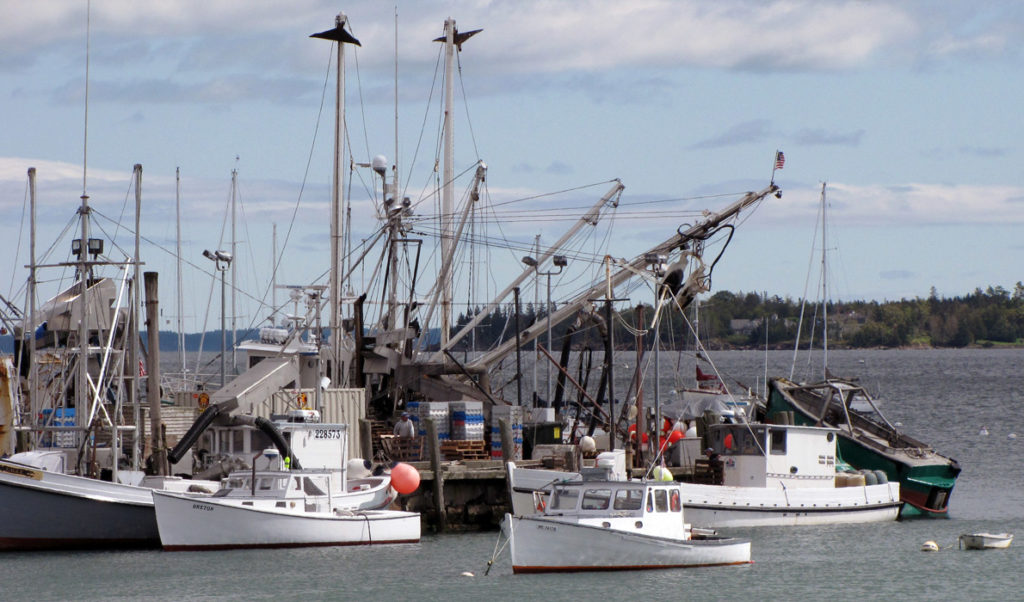Science and research are being targeted for deep cuts in the Trump administration’s proposed budget, and if those cuts are made, Maine’s fisheries will be navigating blind into an uncertain future.
That was the message from a panel that gathered on Thursday, June 29 at the University of Southern Maine in Portland, sponsored by the Natural Resources Council of Maine (NRCM) and Maine Conservation Voters.
The deepest cuts in Trump’s proposed budget come in the Environmental Protection Agency’s funding, with $2.6 billion, or 31 percent of the agency’s budget, on the chopping block. Those cuts would eliminate more than 50 EPA programs, according to a report by NRCM. EPA gives grants to various other agencies, such as Maine Sea Grant.
Panelist Emily Tucker of the Maine Coast Fishermen’s Association said the theme of the cuts seemed to be science and research.
“We’re going to be totally blind,” she said, “scrambling to put out the last fire,” rather than thinking strategically about the volatile marine future, as ocean temperatures rise and sought-after species move.
Being in the dark about climate change, Tucker added, “is really dangerous.”
Dave Cousens and Richard Nelson, who fish for lobster in the Midcoast, were blunt in their concern about the proposed cuts.
On learning that the Trump budget cut funding that supports lobster research, Cousens reacted: “Needless to say, I was more than a little pissed off.” He suspected that with science programs being cut, the public would not notice.
“I’m on the front line, and I’m noticing,” said Cousens, who is president of the 1,200-member Maine Lostermen’s Association.
“We’ve got problems on the horizon,” he said, with warming waters meaning that lobster were moving north and east. Despite the impact of the $500 million lobster fishery, the state funds no research. “The state doesn’t have the money to do this,” he said, which is why the Maine Sea Grant program, which does research, supported by EPA funds, is critical.
Of Trump’s budget, Cousens said: “His goals are short-term economic gains for his base, and screw the rest of us.”
Nelson, who fishes from Friendship, said if the bulk of lobster move away, his community would be devastated. The town’s 1,100 population includes 250 lobster-license holders, he said.
Heather Deese of the Island Institute (publisher of The Working Waterfront), likened the loss of lobstering in coastal and island towns to the closure of paper mills elsewhere in Maine.
“We are off the charts in our dependence on the fisheries,” she said, noting that in 1995, lobstering represented 57 percent of the state’s fisheries, while in 2015, it had reached 95 percent.
“We are the lobster coast here in Maine,” Deese said. “We are dependent on a single animal.”
To help prepare fishermen for a potential downtown, the Island Institute has been offering assistance to lobstermen who want to launch aquaculture businesses as a hedge against declining revenue from lobster.
“We will not be able to do that without Sea Grant support,” she said.
Ivy Frignoca, baykeeper for the Friends of Casco Bay, said the cuts are not aimed at frivolous work.
“This is about public health and our economy,” she said.
As the Casco Baykeeper, Frignoca oversees monitoring of water quality in the bay, which is funded in part by EPA.
“The data that we collect is used by both the state and the federal government,” she said, and is often requested by government agencies.
Chad Coffin of the Maine Clammers Association said warmer waters are hurting the shellfish industry, and if he and others want to raise clams, “We’re going to need information.” That information would come through federally funded research, he said.
In answering a question about the practical implications of the proposed cuts, Curtis Bohlen of the Casco Bay Estuary Partnership said it could mean sewer treatment plants might not have funding for upgrades.
In answering questions from the audience, panelists urged those concerned about the cuts to contact their representatives in Congress. Senators Susan Collins and Angus King had representatives attending the panel discussion.





